
What is Measles?
Some people think of measles as just a little rash and fever that clear up in a few days. But measles can cause serious health complications, especially in children younger than 5 years old. Measles is highly contagious. If one person has it, up to 9 out of 10 people nearby will become infected if they are not protected.
Protect yourself from Measles
The best protection against measles is measles, mumps, and rubella (MMR) vaccine. MMR vaccine provides long-lasting protection against all strains of measles. Learn why getting vaccinated is important.
Get Vaccinated Before You Travel
Get Vaccinated and Prevent Measles
Measles Cases Reported by CDC
Learn More
Measles Exposure
Call your healthcare provider immediately if you think you or your child have been exposed to measles.
Measles symptoms appear 7 to 14 days after contact with the virus. Common measles symptoms include:
- High fever (may spike to more than 104° F)
- Cough
- Runny nose (coryza)
- Red, watery eyes (conjunctivitis)
Measles is very contagious. It spreads through the air when an infected person coughs or sneezes. You can get measles just by being in a room where a person with measles has been. This can happen even up to 2 hours after that person has left.
Measles can lead to serious health complications, particularly in children under 5 years old. Common complications include:
Ear infections: Approximately 1 in 10 children with measles develop ear infections.
Diarrhea: Occurs in less than 1 in 10 individuals with measles. CDC
More severe complications can occur, such as:
Pneumonia: A lung infection that is a leading cause of death from measles in young children. CDC
Encephalitis: Brain inflammation that can lead to permanent brain damage.
It is important to consult a healthcare professional if measles is suspected, especially in young children, to receive appropriate medical care and prevent potential complications
Anyone who is not protected against measles is at risk.
Measles was declared eliminated from the United States in 2000. However, measles is still common in many parts of the world. Every year, measles is brought into the United States by unvaccinated travelers who get measles while they are in other countries. These travelers are mostly Americans and sometimes international visitors.
Some people are a higher risk of experiencing severe complications from measles.